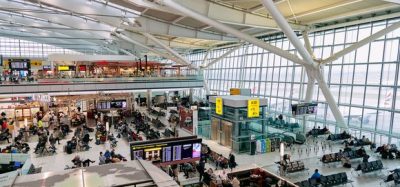Debating the tax that is meant to pay for the environmental costs of air travel
- Like
- Digg
- Del
- Tumblr
- VKontakte
- Buffer
- Love This
- Odnoklassniki
- Meneame
- Blogger
- Amazon
- Yahoo Mail
- Gmail
- AOL
- Newsvine
- HackerNews
- Evernote
- MySpace
- Mail.ru
- Viadeo
- Line
- Comments
- Yummly
- SMS
- Viber
- Telegram
- Subscribe
- Skype
- Facebook Messenger
- Kakao
- LiveJournal
- Yammer
- Edgar
- Fintel
- Mix
- Instapaper
- Copy Link
Posted: 8 October 2019 | Tara Nolan (International Airport Review) | No comments yet
For this column, International Airport Review asked a panel of industry experts: Where do you stand on Air Passenger Duty?


Air Passenger Duty (APD) is a tax imposed by the UK government on all passengers flying out of the UK, first introduced in 1994 to regulate bigger aircraft. Many other countries impose a similar tax, however the UK’s APD is substantially higher, twice that of its next competitor, Germany.
Some industry stakeholders believe that APD is having a detrimental effect on travel, tourism and the economy. Can it be argued, however, that ensuring the longevity of the industry will come at no small cost, both financially and socially? Is a sustainable and responsible approach to aviation a cost worth paying? Or is ADP stifling the UK’s changes of growth in a wider global market?
For this column, International Airport Review spoke to the below, industry-leading, participants to gauge their opinions on APD.
  |   |   |
| Willie Walsh, Chief Executive, IAG | Walter Schoefer, Spokesman of Management Board, Stuttgart Airport | Karen Dee, Chief Executive, AOA |
Willie Walsh: APD is the highest aviation levy worldwide and penalises not only British citizens but those coming to do business or holiday in the UK.
It was set up 25 years ago as a ‘green tax’ but it has never been used to fund any environmental initiative. It is just a revenue-raising tool that supresses business and tourism by making the UK uncompetitive. That’s why APD does not, and will never, work.
The UK must be released from the shackles of this punitive levy
At a time when Britain should be showing the world it is open for business, the government persists in charging people up to £172 to leave the country. Since 1994, APD has increased by 10 per cent each year while the UK GDP has grown by just two per cent annually over the same period.
Last year, British Airways’ customers paid £815 million to the Treasury to leave the UK. In total, IAG passengers’ bill was £885 million. Most were foreign visitors. By charging the highest aviation tax in Europe, Britain is undermining its global competitiveness.
A study by PwC concluded that abolishing APD would immediately boost UK GDP by 0.5 per cent and create 61,000 jobs in the long term. Countries which have scrapped these taxes have seen a boom in air transport and tourism, benefiting their economies as a whole.
Let’s be clear. It’s foolhardy for a trading nation reliant on developing international connections to tax aviation passengers so harshly. The UK must be released from the shackles of this punitive levy if it wants to compete on the global stage post Brexit. APD must be scrapped now.
Walter Schoefer: With the start of the summer holidays, around 200 Fridays for Future activists protested at Stuttgart Airport. For the sake of our climate, they raised awareness for responsible travel and demanded higher flight prices. I endorse their initiative, because climate protection is of outstanding importance.
When we talk about air passenger duty lately – or in Germany the air passenger tax or ticket tax – we are doing so in the context of the current climate debate. The aviation industry in Germany recently suggested appropriating the tax revenues from the German air passenger tax (about €1 billion per year) to a future emission-free aviation. The idea: Reinvesting the money in bringing synthetic jet fuel onto the market. The German air passenger taxes, which came into force 2011, were intended to have a steering effect for more environment-friendly behaviour – just like the now discussed carbon tax on flight tickets. However, such reforms are only credible and truly sustainable if the revenues are devoted to technological progress towards reducing flight emissions.
As an airport operator, we support green technology via our new landing charges
We are the first German airport that uses this instrument to actively encourage innovations, such as electric aircraft and alternative fuels. From now on, electric airplanes can land free of charge at Stuttgart Airport for an entire year. The use of synthetic fuel will be funded by a programme with a volume of €500,000. What we need now is international politics that are committed to accelerate technological progress in aviation.
Karen Dee: Air Passenger Duty (APD) is unsustainable and the Chancellor must take action.
Since its introduction in 1994, APD has increased by 680 per cent for long-haul flights and 160 per cent for short-haul. This has left us with aviation taxes that are the highest in Europe and twice the level of our biggest competitor, Germany.
Aviation is a driver of economic growth and connectivity is key to this growth. APD is stifling this.
This holds the UK back by preventing increased capacity on existing routes and the creation of new routes, particularly outside of London and the South East. As research released in 2018 by Frontier Economics shows, the real-world impacts of APD are profound.
If APD was abolished, 65 new routes would be added, including key routes such as Bristol to Dubai; Edinburgh to Delhi; and Birmingham to Tel Aviv.
Aviation is a driver of economic growth and connectivity is key to this growth. APD is stifling this and risks stalling the government’s approach to international trade. The UK is the only major European nation to have seen a fall in direct connectivity over the last two years. Our neighbours in the Republic of Ireland show the benefits of scrapping APD, with passenger numbers increasing by 48 per cent in the three years after they removed their equivalent tax.
Put simply, APD is unsustainable. It is holding back the connections that we need and our airports from providing businesses and consumers with the increased choice and options. If the government is serious about a truly global Britain, then they need to remove the barriers and allow aviation to play its full role in making this a reality.
Issue
Related topics
Aeronautical revenue, Economy, Regulation and Legislation, Social responsibility
Related airports
Related organisations
Airport Operators Association (AOA), International Airlines Group (IAG)

















